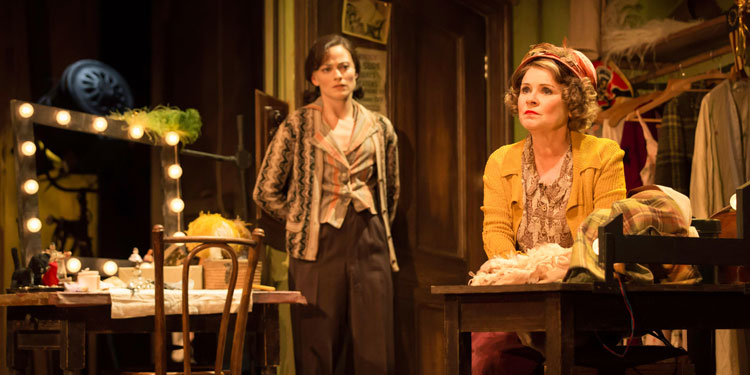 Starring: Imelda Staunton, Peter Davison, Laura Pulver, Gemma Sutton, Dan Burton
Starring: Imelda Staunton, Peter Davison, Laura Pulver, Gemma Sutton, Dan Burton
Directed By: Lonny Price
Running Time: 135 mins
BBFC Certificate: 12
UK Release Date: November 28th 2016 (UK)
The late 1950s was one hell of a time for American musicals, with the likes of West Side Story, My Fair Lady, The Sound Of Music and Gypsy all debuting on Broadway. While all of them have been held up by different people as the greatest musical ever, most agree that the best female mainstream musical role ever written is Rose in Gypsy – indeed, it’s sometimes referred to as the King Lear of musical theatre. Over the years Ethel Merman, Angela Lansbury, Tyne Daly, Bernadette Peters, and Patti LuPone have all played the role on Broadway, while Rosalind Russell appeared in the 1962 movie version, and Bette Midler took the part in a 2003 TV movie.
In 2015 it was the turn of Imelda Staunton, fresh from her fabulous, Olivier Award-winning turn in a West End version of Sweeney Todd (before that, few people thought of her as a musical actress, but she’s actually got a long history in the genre, from Into The Woods (for which she won another Olivier back in 1991) to Guys & Dolls). Staunton got rave reviews and another Olivier Award for the musical’s limited run at London’s Savoy Theatre, and as this recording of the production proves, it’s easy to see why.
She is absolutely brilliant as Rose, bringing just the right amount of brassy fire and monstrous bossiness, mixed with a hint of vulnerability and a palpable sense of her love for her daughters. Those two last things are vitally important, as Mama Rose has become the archetype for the overbearing stage mother who forces their children to live out their dreams with little regard for the kids themselves. As a result, it’s easy to play her as a grotesque caricature. However, as Staunton shows, there’s more to her than that – Rose is a force of nature determined to keep the wolf from the door, and that while her single-minded determination constantly threatens to destroy everyone around her, it comes from a place of both misguided love and unspoken fear.
Loosely based on the autobiography of the legendary stripper, Gypsy Rose Lee, the musical focuses on her early years, and most particularly her mother. In the 1920s, Mama Rose is determined that her daughter, Baby June, will become a star of the vaudeville circuit. However, when she begins to grow (despite Rose’s insistence that June and the rest of the troupe must stay kids forever), June rebels against her mother’s stringent way and elopes.
Undaunted, Rose turns her attention to her other daughter, Louise (Laura Pulver), a shy young woman who Rose has been telling has no talent since she was little. Rather than giving up, Rose decides that with the right pushing, Louise can become a star – and no one else has a choice in the matter. However, when they accidentally end up at a burlesque theatre, a new career beckons for Louise – as Gypsy Rose Lee – something that isn’t exactly what Rose had bargained for.
The Savoy Theatre has a narrower stage than many West End theatres known for hosting musicals, but the production uses it to the fullest, allowing Gypsy to have a surprisingly intimate feel, while opening things up for bigger moments. It also ensures that the focus is firmly on the absolutely magnetic and quite frankly brilliant Staunton, firmly backed up the also excellent Laura Pulver as the adult Louise, and Peter Davison in the slightly thankless role of the besotted doormat Herbie.
While the orchestra initially feels a little small for a show known for its big numbers, they step up when it matters, ensuring that the likes of Let Me Entertain You?, Some People and Everything’s Coming Up Roses work exceedingly well.
As well as being a great production in its own right, which does real justice to Arthur Laurents’ book, Stephen Sondheim’s lyrics and Jule Styne’s music, it’s also very smartly filmed. Often it feels like little thought goes into shooting a stage production, resulting in it being a rather tedious, distancing experience. However, here someone has obviously spent time considering what needs to be shown, whether that’s the fact that sometimes showing someone’s reaction is more important than showing the person speaking, or that there’s a difference between the viewpoint of a theatregoer and someone watching it on a screen. It means that despite being stage-bound, it often has a rather filmic feel, particularly in the smaller, more character-driven moments.
The only genuinely bad thing about it is that it will make a lot of viewers annoyed they never got to see it live during its limited Savoy Theatre run.
Overall Verdict: A great production of one of the best American musicals, anchored by a truly mesmerising performance by a barn-storming Imelda Staunton.
Reviewer: Tim Isaac
You must be logged in to post a comment.